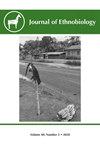Cycad Regulation and Community Creation: South African Stakeholder Perspectives on Conservation
IF 1.3
3区 社会学
Q1 ANTHROPOLOGY
引用次数: 0
Abstract
Cycads play a central role in Lobedu cultural mythology, with widespread acknowledgment of their cultural and spiritual values, as well as their instrumental use in rainmaking and coronation ceremonies. They are also widely prized as collectors’ items, both nationally and internationally, commanding high prices and placing them in the unenviable position of being among the world's most frequently trafficked plants. South African cycad species, most of which are endangered and all of which are protected, are heavily regulated, with the ownership, trade, and use of cycads requiring a permit. This article explores how regulations are understood by different stakeholders in cycad conservation. Traditional authorities, state institutions, and communities may collaborate in conservation, but also interpret and enact policies divergently. Processes of regulating cycad trade and propagation both reinforce and challenge certain aspects of community identity.Cycad Regulation and Community Creation:南非利益相关者的保护观点
苏铁在洛贝杜人的文化神话中扮演着重要角色,其文化和精神价值得到广泛认可,并被用于祈雨和加冕仪式。苏铁在国内和国际上也广受收藏家的青睐,价格昂贵,是世界上贩运最频繁的植物之一。南非的苏铁物种大多濒临灭绝,全部受到保护,它们受到严格管制,拥有、交易和使用苏铁都需要许可证。本文探讨了苏铁保护中不同利益相关者对法规的理解。传统当局、国家机构和社区可能会在保护方面进行合作,但在解释和制定政策方面也存在分歧。苏铁贸易和繁殖的监管过程既强化了社区身份的某些方面,也对其提出了挑战。
本文章由计算机程序翻译,如有差异,请以英文原文为准。
求助全文
约1分钟内获得全文
求助全文
来源期刊

Journal of Ethnobiology
Social Sciences-Anthropology
CiteScore
4.80
自引率
3.40%
发文量
21
审稿时长
>12 weeks
期刊介绍:
JoE’s readership is as wide and diverse as ethnobiology itself, with readers spanning from both the natural and social sciences. Not surprisingly, a glance at the papers published in the Journal reveals the depth and breadth of topics, extending from studies in archaeology and the origins of agriculture, to folk classification systems, to food composition, plants, birds, mammals, fungi and everything in between.
Research areas published in JoE include but are not limited to neo- and paleo-ethnobiology, zooarchaeology, ethnobotany, ethnozoology, ethnopharmacology, ethnoecology, linguistic ethnobiology, human paleoecology, and many other related fields of study within anthropology and biology, such as taxonomy, conservation biology, ethnography, political ecology, and cognitive and cultural anthropology.
JoE does not limit itself to a single perspective, approach or discipline, but seeks to represent the full spectrum and wide diversity of the field of ethnobiology, including cognitive, symbolic, linguistic, ecological, and economic aspects of human interactions with our living world. Articles that significantly advance ethnobiological theory and/or methodology are particularly welcome, as well as studies bridging across disciplines and knowledge systems. JoE does not publish uncontextualized data such as species lists; appropriate submissions must elaborate on the ethnobiological context of findings.
 求助内容:
求助内容: 应助结果提醒方式:
应助结果提醒方式:


